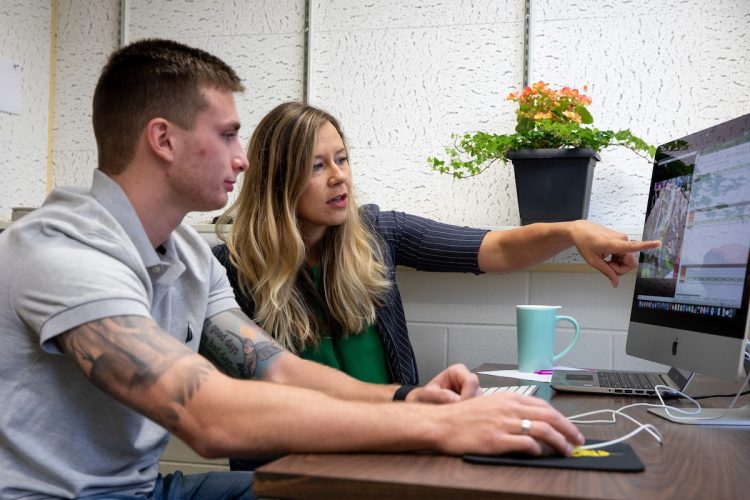Finding a rhythm: Summer Research project examines child behavior in group musical settings

Alex Conway and professor Sara Beck look for different behaviors among children in pre-k music classes
Alex Conway ’20 has worked at the UP Foundation in Lynchburg for the last two years. The organization provides addiction counseling, recovery, and rehabilitation services for local youth, so Conway is always looking for new ways to get through to adolescents and teens. Fortunately, a Summer Research project with psychology professor Sara Beck could give him some new methods to determine if children are actually paying attention in educational settings.
For the project, he and Beck are using behavioral coding to monitor the social engagement of children, specifically in group musical activities. They are watching videos of pre-kindergarten students in music classes in Nashville, Tennessee, recorded and provided by Jessica Lawson, a researcher at Vanderbilt University. In the videos, Conway and Beck are recording the children’s movements and nonverbal cues to determine the level of participation. Three of the conditions they are coding for are rhythm, melody, and vocalization.
“Some of the variables we’re looking for are direction of gaze and gesture participation,” Conway said. “Both of the songs being played have different gestures that the instructor performs, and we’re coding to see how often the kids are following their lead.”
“It’s really about figuring out how to operationalize these variables of interest,” Beck added. “We’d like to see if musical engagement varies across these conditions, and if so, how. Then we also want to figure out how to quantify the variables of interest.”
During the first phase of the project, Conway consulted other studies to determine the best method of behavioral coding; however, there were limited examples for group settings. Ultimately he and Beck chose a coding scheme called momentary time sampling. In this technique, he stops the video every 10 seconds and notes each child’s direction of gaze and gesture participation. For vocalization, he is watching each 10-second segment to determine whether or not each child was singing. After Conway enters his data, Beck also watches the videos to make sure they’re seeing the same behaviors.
Despite the scientific nature of their work, Conway and Beck have mostly observed kids being kids.
“In one of the videos, there’s a boy who kept four fingers in his mouth for almost a full minute,” he laughed. “We’ve also seen plenty of nose picking.”
Both Conway and Beck were eager for the opportunity to do Summer Research. As a first-year faculty member, Beck didn’t imagine she would have the chance to continue her previous research on children’s social behaviors when it comes to music.
“This presented an opportunity to think fundamentally about something that I think about a lot, which is music as a scaffold for social engagement,” she said. “I also thought that developing a behavioral coding system for these kinds of settings would be something that I would be able to potentially use a lot more in the future.”
Conway has had the opportunity to meet with other researchers in the field of psychology at Vanderbilt University. He is considering a career either working with children or in applied research related to addiction.
“I wanted to have the opportunity to do something more than just read a literature review about data other people collected,” he said. “I think as I’ve been doing Summer Research, I’ve also found that the research side of psychology and especially measuring social engagement is really fascinating.”
Tags: Alex Conway, psychology, Sara Beck, student faculty research, summer research, summer research 2019
